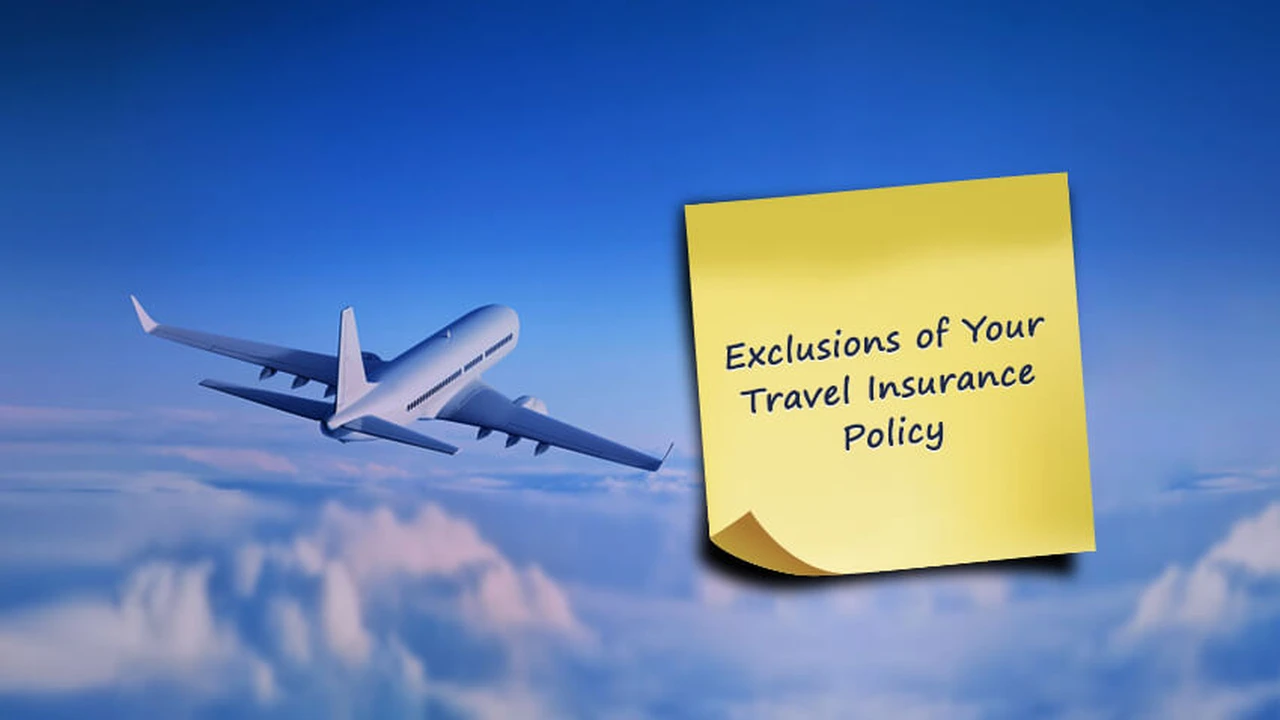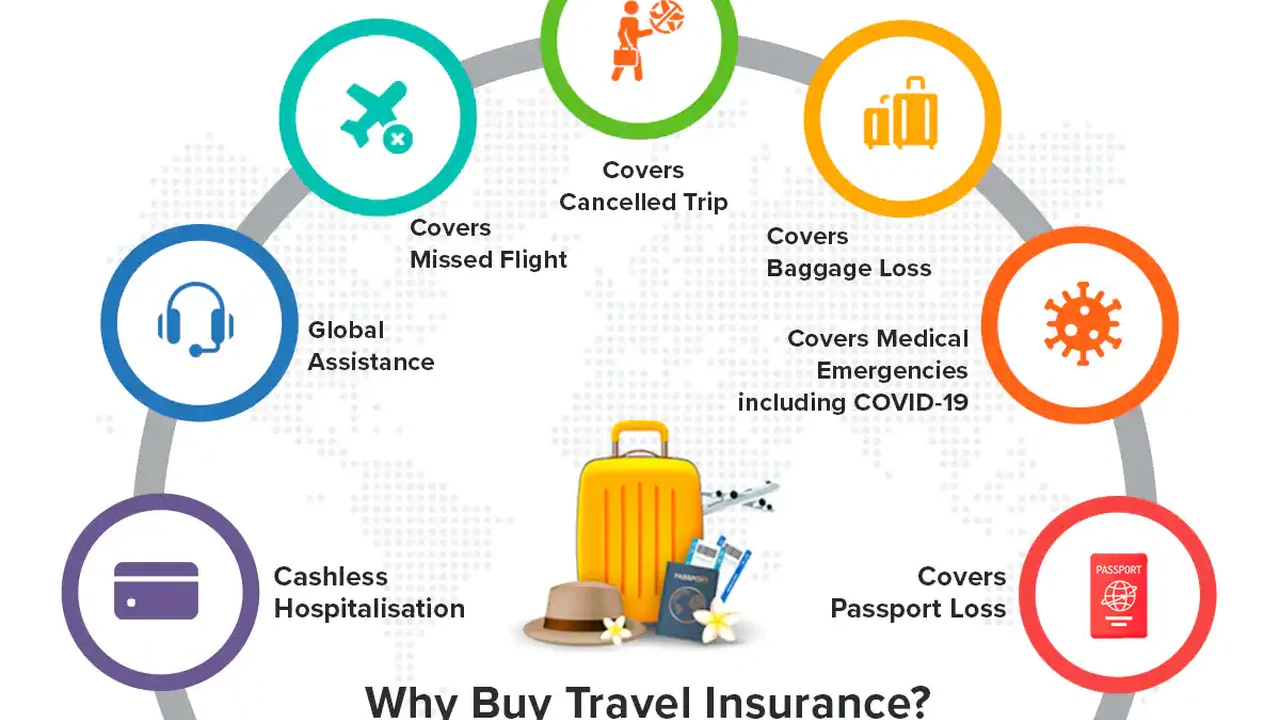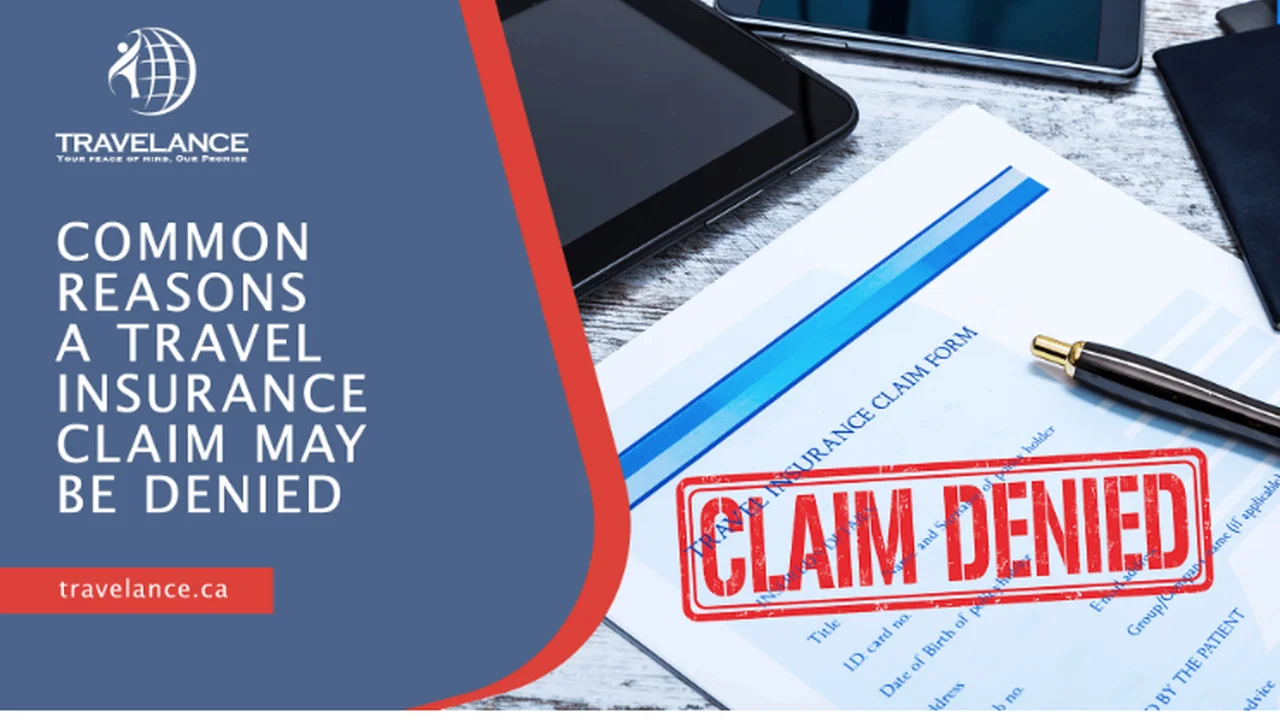Hidden Exclusions in Travel Insurance: What You Need to Know

Understanding Common Travel Insurance Exclusions Travel Smart
Okay, so you're planning an awesome trip! Sun, sand, adventure... you’ve got it all figured out, right? But hold on a sec. Before you pack your bags and jet off, let's talk about something kinda boring, but super important: travel insurance. Specifically, the sneaky little exclusions that can leave you high and dry when you least expect it. Think of this as your travel insurance decoder ring. We're going to crack the code and help you avoid some serious headaches.
Travel insurance. It sounds like a lifesaver, and it can be. But it’s not a magic shield that protects you from *everything*. Policies are packed with fine print, and that’s where those pesky exclusions hide. These are situations where your insurance company *won’t* pay out. Knowing what they are is half the battle.
Pre-Existing Medical Conditions Travel Insurance Coverage
This is a big one. If you have a medical condition *before* you buy your policy, it might not be covered. Think diabetes, heart problems, asthma… anything you’ve seen a doctor for. Insurance companies worry that these conditions are more likely to cause problems while you’re traveling.
Now, some policies *do* cover pre-existing conditions, but often with restrictions. They might require you to fill out a detailed medical questionnaire or pay a higher premium. And even then, they might only cover *acute* flare-ups of your condition, not routine care.
Example: Let’s say you have asthma and you get a chest infection while on vacation. If your asthma is considered a pre-existing condition, the insurance company might only cover the cost of treating the chest infection, *not* the asthma itself. Read the fine print carefully!
What to do: Disclose everything! Even if you think it's minor. Honesty is the best policy (pun intended!). Compare policies that offer coverage for pre-existing conditions and understand the limitations.
Adventure Activities and Extreme Sports Travel Insurance for Thrill Seekers
Love to bungee jump? Fancy a bit of white-water rafting? Travel insurance companies often frown upon activities they consider "high-risk." This can include things like rock climbing, scuba diving, skiing, snowboarding, and even certain types of hiking.
The reason is simple: these activities increase your chances of getting injured. If you break a leg while skiing, your standard travel insurance policy might not cover the medical bills.
Example: You decide to go paragliding in the Alps. You have a minor accident and need medical attention. If your policy excludes paragliding, you're on the hook for the costs, which can be substantial.
What to do: If you're planning any adventure activities, check your policy *before* you go. Look for specific exclusions related to those activities. You might need to buy an add-on or a specialized travel insurance policy that covers extreme sports.
Unattended Luggage and Personal Belongings Travel Insurance Claims
Left your backpack unattended for a minute while you grabbed a coffee? If it gets stolen, your travel insurance might not cover it. Most policies have clauses about negligence. If you’re careless with your belongings, they won’t pay out. This includes leaving valuables in plain sight in your hotel room or leaving your luggage unattended in a public place.
Example: You leave your laptop on a table at a cafe while you go to the restroom. When you come back, it's gone. Because you left it unattended, the insurance company might deny your claim.
What to do: Be vigilant! Keep your belongings with you at all times, or store them securely in a safe or locker. Take photos of your valuables before you leave on your trip, and keep receipts as proof of ownership.
Alcohol and Drug-Related Incidents Travel Insurance Limitations
This one’s pretty straightforward. If you get injured or have an accident while under the influence of alcohol or drugs, your travel insurance is unlikely to cover you. Insurance companies aren't going to pay for incidents caused by your own intoxication.
Example: You've had a few too many drinks and fall down some stairs, breaking your arm. The insurance company will likely deny your claim because the injury was alcohol-related.
What to do: Use common sense! Drink responsibly and avoid using drugs while traveling. It's not worth risking your health and your insurance coverage.
Acts of Terrorism Civil Unrest and Political Instability Travel Insurance Coverage
Travel insurance policies often have exclusions related to acts of terrorism, civil unrest, and political instability. If you’re traveling to a country with a high risk of these events, your insurance might not cover you if you’re affected.
Example: You're traveling in a country where there's a political uprising. You get caught in the middle of a protest and are injured. Your insurance policy may not cover your medical expenses if it excludes incidents related to civil unrest.
What to do: Before you travel, check your government's travel advisories for the destination. Consider purchasing a policy that specifically covers incidents related to terrorism or political instability, if available. Be aware of your surroundings and avoid areas where there's a risk of unrest.
Specific Travel Destinations Travel Insurance Restrictions
Some travel insurance policies have restrictions on where you can travel. They might exclude certain countries or regions that are considered high-risk due to political instability, natural disasters, or health concerns. For example, some policies may not cover travel to areas affected by war or epidemics.
Example: You're planning a trip to a country that's currently experiencing a widespread outbreak of a disease. Your insurance policy may not cover any medical expenses related to that disease if you travel there.
What to do: Before you book your trip, check your insurance policy to see if there are any destination restrictions. If you're planning to travel to a high-risk area, consider purchasing a policy that specifically covers travel to those regions.
The Devil is in the Details Reading Your Travel Insurance Policy
The key to avoiding travel insurance pitfalls is to read your policy carefully. Don't just skim it! Pay attention to the exclusions and limitations. If you don't understand something, ask the insurance company to explain it to you. Don’t be afraid to ask questions. It's better to be informed before you travel than to be surprised later.
Think of it like this: your travel insurance policy is a contract. You need to understand what you're agreeing to before you sign it.
Choosing the Right Travel Insurance Policy Travel Insurance Recommendations
Okay, so now you know what to watch out for. But how do you actually choose the right travel insurance policy? Here are a few things to consider:
* **Your destination:** Where are you going? Different countries have different risks. * **Your activities:** What are you planning to do? Are you going to be doing any adventure activities? * **Your medical history:** Do you have any pre-existing medical conditions? * **Your budget:** How much are you willing to spend on travel insurance?Based on these factors, here are a few travel insurance options you might consider:
World Nomads Travel Insurance For Adventurous Travelers
World Nomads is a popular choice for adventurous travelers. They offer comprehensive coverage for a wide range of activities, including skiing, snowboarding, scuba diving, and rock climbing. They also cover pre-existing medical conditions (subject to certain limitations) and offer 24/7 emergency assistance.
Ideal for: Backpackers, adventure travelers, and people who participate in extreme sports.
Pros:
- Comprehensive coverage for adventure activities
- Coverage for pre-existing medical conditions (with limitations)
- 24/7 emergency assistance
- Flexible policy options
Cons:
- Can be more expensive than other options
- Exclusions for certain activities and destinations
Example Scenario: You're planning a backpacking trip through Southeast Asia, including trekking in the Himalayas. World Nomads would be a good choice because it covers trekking at high altitudes and provides emergency evacuation services. The price for a 2-week trip could range from $100 to $200 depending on the level of coverage.
Allianz Travel Insurance For Family Vacations and Cruises
Allianz Travel Insurance is a well-known and reputable provider offering a range of policies for different types of travelers. They offer comprehensive coverage for trip cancellations, medical emergencies, and lost luggage. They also have options for family plans and cruise travel.
Ideal for: Families, cruise passengers, and people who want comprehensive coverage for trip cancellations.
Pros:
- Wide range of policy options
- Coverage for trip cancellations and interruptions
- Family plans available
- Cruise-specific coverage
Cons:
- Can be more expensive than basic plans
- Pre-existing condition coverage may be limited
Example Scenario: You're planning a family vacation to Disney World. Allianz Travel Insurance would be a good choice because it covers trip cancellations due to illness or injury and provides coverage for lost or delayed luggage. The price for a family of four for a week-long trip could range from $200 to $400 depending on the level of coverage.
Travel Guard Travel Insurance For Budget-Conscious Travelers
Travel Guard offers a variety of travel insurance policies at different price points. They have basic plans that cover essential medical expenses and trip cancellations, as well as more comprehensive plans that offer additional coverage. They are a good option for budget-conscious travelers who want basic protection.
Ideal for: Budget travelers, people who want basic medical and trip cancellation coverage.
Pros:
- Affordable prices
- Basic medical and trip cancellation coverage
- 24/7 assistance
Cons:
- Limited coverage compared to more comprehensive plans
- May not cover pre-existing conditions
Example Scenario: You're planning a weekend getaway to a nearby city. Travel Guard would be a good choice because it offers affordable basic coverage for medical emergencies and trip cancellations. The price for a weekend trip could range from $30 to $50.
Comparing Travel Insurance Policies Finding the Best Fit
When comparing travel insurance policies, pay attention to the following factors:
* **Coverage limits:** How much will the policy pay out for medical expenses, trip cancellations, and lost luggage? * **Deductibles:** How much will you have to pay out of pocket before the insurance company starts paying? * **Exclusions:** What situations are not covered by the policy? * **24/7 assistance:** Does the insurance company offer 24/7 emergency assistance? * **Customer reviews:** What do other travelers say about their experience with the insurance company?Use online comparison tools to compare policies from different providers and find the best fit for your needs and budget.
Travel Insurance Cost Factors Understanding Pricing
The cost of travel insurance can vary depending on a number of factors, including:
* **Your age:** Older travelers typically pay more for travel insurance. * **Your destination:** Travel to high-risk countries can increase the cost of insurance. * **The length of your trip:** Longer trips typically cost more to insure. * **The level of coverage:** More comprehensive policies cost more than basic plans. * **Your deductible:** Lower deductibles typically result in higher premiums.Get quotes from several different insurance companies to compare prices and find the best deal. Remember that the cheapest policy isn't always the best. Make sure the policy provides adequate coverage for your needs.
Real-Life Travel Insurance Claim Scenarios Learning from Experience
Reading about real-life travel insurance claims can help you understand how policies work and what to expect in case of an emergency.
Scenario 1: Broken Leg in Thailand
A traveler broke their leg while hiking in Thailand. They had purchased a comprehensive travel insurance policy that covered medical expenses and emergency evacuation. The insurance company paid for their medical treatment in Thailand and flew them home to the United States for further care. The total cost of the claim was over $20,000.
Scenario 2: Lost Luggage on a Cruise
A family lost their luggage on a cruise. They had purchased a travel insurance policy that covered lost luggage. The insurance company reimbursed them for the cost of their lost belongings, including clothing, toiletries, and electronics. The total cost of the claim was $1,500.
Scenario 3: Trip Cancellation Due to Illness
A traveler had to cancel their trip due to a sudden illness. They had purchased a travel insurance policy that covered trip cancellations. The insurance company reimbursed them for the non-refundable costs of their trip, including flights and hotels. The total cost of the claim was $3,000.
These scenarios illustrate the importance of having adequate travel insurance coverage. While you may not need to use your insurance, it can provide peace of mind and financial protection in case of an unexpected event.
Staying Informed Travel Insurance Updates and Resources
The world of travel insurance is constantly evolving. Stay informed about the latest updates and resources by:
* **Following travel insurance blogs and websites:** Many websites provide valuable information about travel insurance, including reviews, comparisons, and news updates. * **Subscribing to travel insurance newsletters:** Stay up-to-date on the latest travel insurance trends and tips by subscribing to newsletters from reputable providers. * **Consulting with a travel insurance expert:** If you have complex travel insurance needs, consider consulting with a travel insurance expert who can help you find the right policy.By staying informed, you can make sure you have the best possible travel insurance coverage for your trips.
:max_bytes(150000):strip_icc()/277019-baked-pork-chops-with-cream-of-mushroom-soup-DDMFS-beauty-4x3-BG-7505-5762b731cf30447d9cbbbbbf387beafa.jpg)






